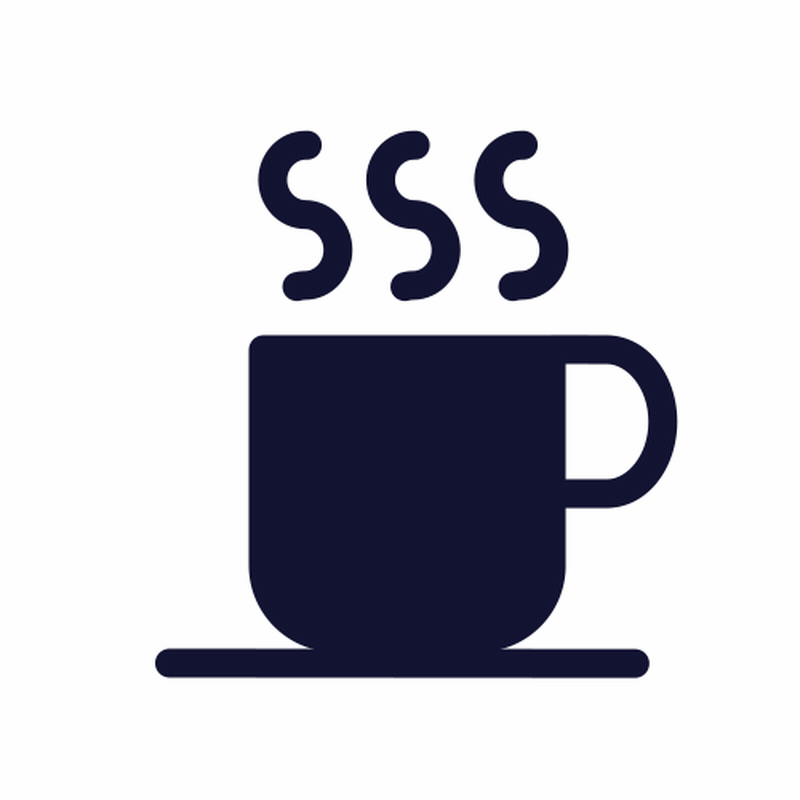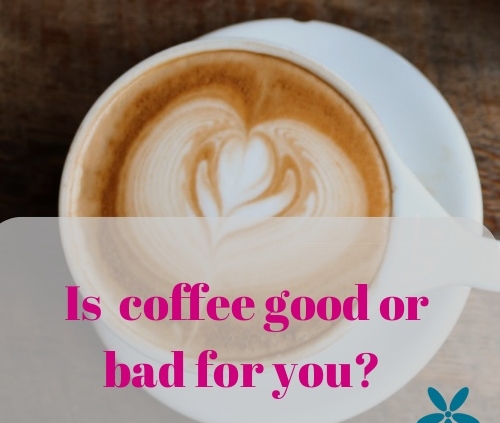I am Italian and I love coffee!
I love its aroma in the morning especially if it comes from a Moka, a traditional Italian cafetière as it brings back sweet memories of Italy and family.
Italians like their coffee strong, in a warm espresso cup, and more than often they take it while standing.
With an espresso in me, I can go at 100 miles per hour and feel nicely wired, but when I take more or drink it daily for a few weeks I know I will have to pay for it …..
Coffee is not evil, at least not for everyone …..we are all different and there is research to support the consumption of a moderate amount of coffee daily, in fact drinking coffee may help to reduce the risk of certain digestive disorders, including gallstone disease and pancreatitis.
Coffee consumption may also help reduce the risk of neurodegenerative conditions such as Alzheimer’s and Parkison’s disease. There are quite a few studies that support this connection, but further studies are needed to prove causality between coffee consumption and the risk of developing these conditions.
Coffee may also have some protective cardiovascular effects for women, it’s high in antioxidants and it’s delicious!
But just because it has beneficial effects doesn’t mean that having more coffees is good for us.
I believe that it is important to tune in and listen to what your body is telling you.
At times even on one coffee per day, I can feel wired, on hedge and anxious, my muscles tense up and I can get different types of pains.
These signs are enough of a red flag and show me that I can’t metabolise caffeine very well… ad that I should give it up.

HERE ARE MY 8 REASONS FOR BEING CAFFEINE FREE OR/AND LIMITING MY COFFEE INTAKE
More restful and prolonged sleep
Some research studies show that daily coffee intake can alter the sleep cycle, causing restless, un-refreshing sleep, and daytime drowsiness. Each one of us will react differently to coffee and genetic makeup will determine how affected you are.
If you suffer from anxiety and sleeplessness, it is worth trying being caffeine-free and see if it makes a difference for you.
One less Anxiety trigger
Coffee is a well known psychoactive and act as an anxiety trigger by stimulating sensations that mimic anxiety such as increased breathing rate and a faster heartbeat. Your body would not know that it is JUST the coffee, it feels like anxiety it is anxiety! Consuming more than 200 mg of caffeine (more or less two cups of coffee) can increase anxiety and panic attacks in people sensitive to it. In fact “caffeine-induced anxiety disorder” is listed in the DSM-5 (Diagnostic and Statistical Manual of Mental Disorders, Fifth Edition).
Less Hormonal imbalances
The liver detoxifies caffeine using the CYP1A2 enzyme system, which is also responsible for the initial metabolism of estrogen during Phase I clearance by the liver. This is one reason caffeine can be metabolised more slowly in women taking oral contraceptives or postmenopausal hormone replacement therapy. Less work for the liver to do, better clearance of toxins and hormones for you!
Reduce your exposure to mycotoxins and pesticides
Some studies analysed coffee brands and tested them for mycotoxins the results showed that Roasted coffee has fewer mycotoxins. If you want to make sure that your coffee is free from mycotoxins some brands assures you their absence such as https://mindfulcoffee.co.uk/ or the US brand Purity coffee https://puritycoffee.com.
If you choose organic your coffee will be richer in antioxidants and it is worth noticing that sometimes some of the side effects of coffee are due to the pesticides that are still present in the coffee grains. If you are sensitive like me you might experiment palpitations when drinking some chemically-laden coffee.
Less stress
Caffeine affects the activity of the hypothalamic-pituitary-adrenal (HPA) axis: The HPA axis influences the body’s ability to manage and deal with stress.
The adrenal glands secrete two major hormones: adrenalin and cortisol. Adrenalin increases respiration rate, heart rate, and blood pressure; while cortisol frees up glucose as we need it in greater amounts during times of perceived stress. A clever mechanism that can become damaging for the body when we are stuck in chronic stress mode. Caffeine increases cortisol and adrenaline at rest, levels of cortisol after caffeine consumption are similar to those experienced during acute stress. Drinking coffee, in other words, simulates stress conditions for the body.
More balanced blood sugar
As already touched upon caffeine creates a stress hormone response and one of the roles of cortisol and adrenalin is to mobilise glucose stored in the liver and pour it into the bloodstream so that it can be used for rapid energy needs (running for your life!!). This scenario can increase insulin resistance.
One of insulin roles is to signal cells to take in glucose from the blood so that it is used for energy.
Insulin resistance occurs when the body cannot deliver glucose into the cells (where it is needed) as the cells become less receptive. When this happens the body releases ever-larger amounts of insulin to try and accomplish its job.
It is a bit like when I keep talking and nagging my husband and he just stops listening to me, the body does the same thing it tunes out becoming less sensitive to insulin’s, meaning more circulating glucose (more nagging on my side), which in turn would mean more insulin release… and so on.
Lower blood pressure
Caffeine seems to have temporary effects on blood pressure, due to its effect on the nervous system. More so on people that don’t drink it regularly.
Positive effects on brain function and mood
Elevated blood sugar and insulin can create imbalances in the neurotransmitters serotonin, dopamine, and GABA, which can lead to sub-clinical mood problems such as mild depression, irritability, impaired cognition, and lack of motivation.
People with chronically high glucose and stress can experience “fuzzy brain”, and memory loss. If we add the potential B-vitamin and iron (both essential for energy) deficiency that coffee consumption can create we can see how easy it is to be in a coffee loop where one feels the need to have coffee to keep functioning properly.
Drinking coffee in large quantities throughout the day, with sugar a bit of chocolate …add high levels of stress coupled with a lack of exercise …it is a ticking time bomb!!
We all respond differently, but If you are prone to anxiety and panic attacks I suggest you keep track of your lattes, espressos, Chai lattes, etc.
Don’t forget to add all the other sources of caffeine that you consume such as colas, chocolates, some pain medications, energy drinks, teas, etc
Pay attention to how you feel when you drink coffee.
Do you feel good for a little bit, then shaky and irritable?
Do you notice any pain or other physical distress?
Do you find you get more bloated if you drink coffee?
If you’re experiencing any of these symptoms then it is time you taper yourself off coffee and caffeine slowly, most people see improvements in their anxiety levels, try some of the coffee substitutes or semi-substitutes that I have been exploring in the last few months.
CHICORY COFFEE
I have started drinking chicory root coffee I have become quite fond of it, love its hearty and bitter taste, it is similar to coffee without the caffeine kick.
Chicory root coffee comes with some health benefits:
there is research supporting its effects on regulating hunger, improving gut bacteria function as it is high in inulin a fiver that supports a healthy gut by favoring the production of bifidobacteria and lactobacilli, and insulin sensitivity.
Some people may experience gas and bloat with chicory coffee.
It also stimulates bile production favoring the digestion of fatty foods.
If you don’t want to go all way and just reduce your caffeine intake you can mix some chicory root powder with some coffee powder…
Be careful as it is not safe to have chicory if you are pregnant or breastfeeding.
Caffeine: NO
MUSHROOM COFFEE
Caffeine: depends on brands
Concentrated extract Medicinal Mushroom powder with their major health benefits are blended with organic arabica coffee. I have tried Foursigma immune and absolutely enjoyed its round and smooth taste, the mushroom flavour is barely there and it just tasted like coffee with less caffeine for a cup at 50 mg.
While regular coffee can be linked to anxiety and insomnia thanks to all that caffeine, the addition of mushroom powder is s said to result in a more balanced cup. And drinkers of mushroom coffee say it’s not as likely to make health concerns like anxiety and insomnia worse. Possible Health Benefits will depend on the mushrooms powder added but they are generally loaded with antioxidants, coupled with the high content of antioxidants in coffee mushroom coffee is bound to Decreases Oxidative Stress: a good move to warn off most diseases.
MATCHA TEA
Another popular coffee substitution is Matcha, Matcha comes with the added benefits of a partial caffeine buzz (if this is what you are after). Matcha tea bags are ok but if you didn’t like them please try Matcha again and go for high-grade matcha or ceremonial grade powder, the greener the better as richer in antioxidants with a smoother and more elegant taste.
Matcha tea bags are to Matcha ceremonial grade tea what supermarket bought pizza is to a freshly baked Neapolitan pizza.
Matcha is good for mental health:
Matcha contains L-Theanine an amino acid that increases mental focus and alertness without no side effects
L-Theanine increases the production of alpha waves in the brain, alpha waves increase relaxation and focus without drowsiness
L-theanine is also used as a supplement to curb anxiety
L-theanine slows down the caffeine absorption reducing the ups and downs that come with caffeine
Matcha is rich in EpitoGalloCathechinGallate (EPGCG) a powerful, powerful antioxidant
Matcha is rich in Chlorophyll which a detoxifier
Matcha has antibacterial properties: good for mouth health
And many more health benefits.
TIP:
take your matcha with some lemon to increase its nutrients availability
Don’t use boiling water, let it cool for a minute then place a teaspoon of matcha with a teaspoon of water in the cup and create the consistency of a smooth paste, then slowly add hot water. Whisk the matcha and water, ideally use a bamboo brush until the mixture is frothy and thick. Then add the rest of the water and enjoy it!
Caffeine: Yes
BARLEY COFFEE or ORZO coffee
Orzo coffee is an Italian favourite … and it can be prepared with a traditional Italian coffee machine or as an instant coffee depending on the brand you buy and how the grains have been prepared.
It contains gluten even if in small quantities.
Caffeine: No
DECAFFEINATED COFFEE
Caffeine: traces of caffeine
Make sure that your decaf is being decaffeinated avoiding the use of solvents. I always check if the package specifies ‘Swiss water process’ or no solvents. One of my favourite for a Nespresso machine is the CRU KAFE ORGANIC DECAF line. I like Equal Exchange Organic Decaffeinated ground coffee (Medium Roasted). I have also been suggested www.buzzcoffee.co.uk a small uk company that takes great care in preparing their coffee.
Please note this article doesn’t include all the available research on coffee but highlights findings based on my personal experience and the consultation of some research papers.
The content of this article is not meant to substitute medical advice and it is for education only. If you wish to have more information and references to the research paper used please do contact me. I have no affilation to the brands named.



